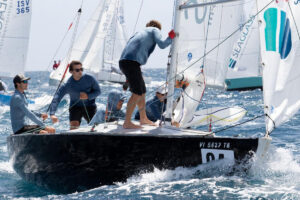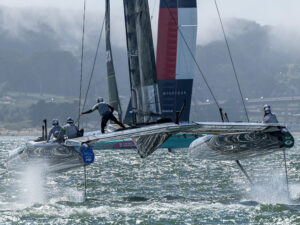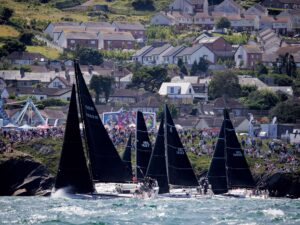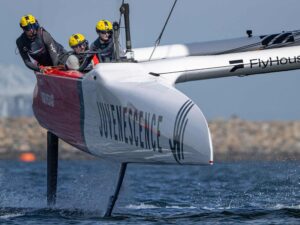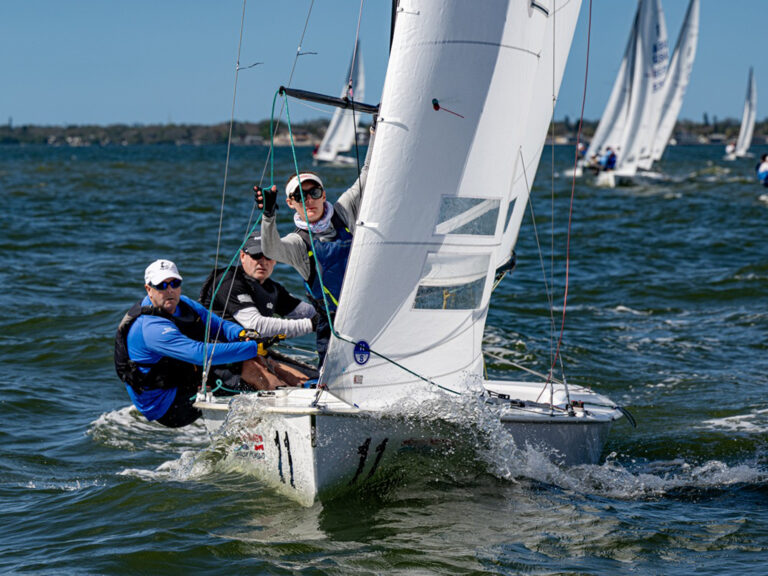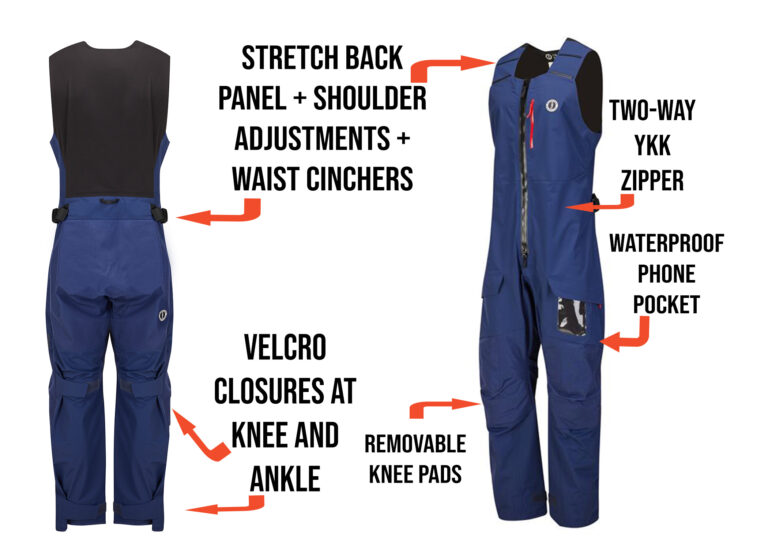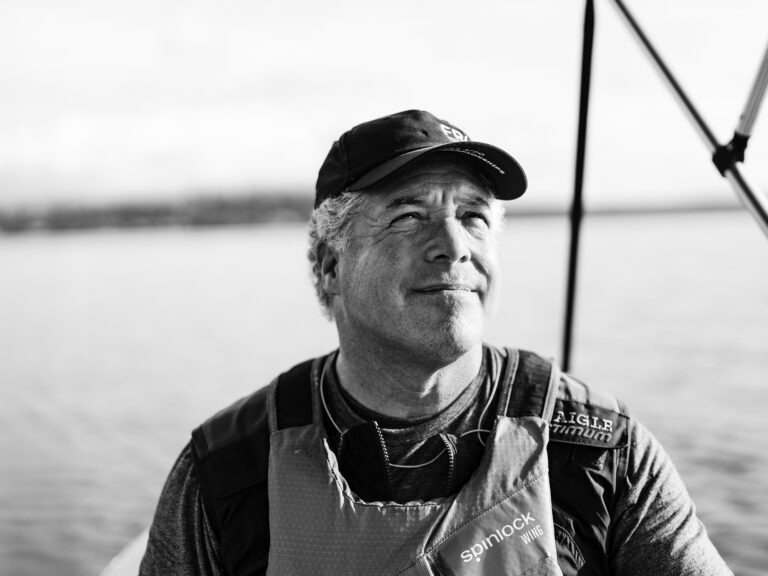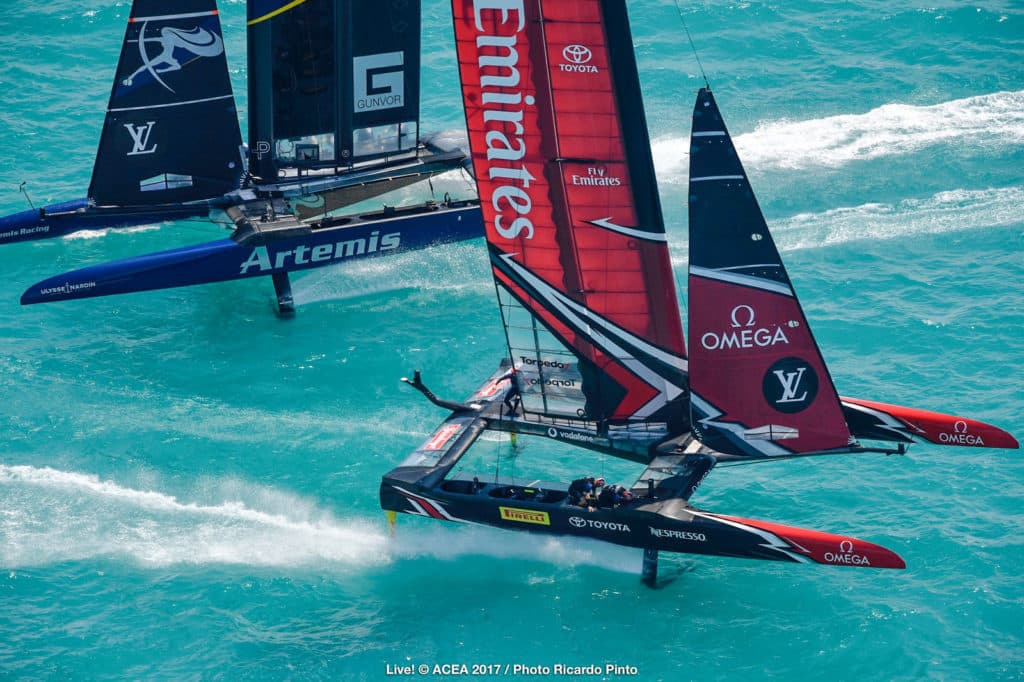
If there’s one thing to be said about AC35 underdog Groupama Team France, it’s that they come out hot. On successive days, they’ve been first to battle and first to take a scalp. Yesterday they took it from Artemis Racing Team, and this morning it was Land Rover BAR’s turn before the knife.
Essentially written off before the Round Robins even started a few days ago, the scrappy French squad is now proven capable of dismissing top-tier squads when things go their way. As they sailed the first race today they appeared to be an altogether different team – faster, smoother, and maintaining flight far more regularly than 48 hours earlier.
Better control…voila…better results.
Their boat is considered by other sailors here to be fast, as is their foil package, so perhaps it’s simply a matter of bringing their board controls and software up to speed, as well as improving their boathandling and racecourse management. As skipper Frank Cammas confessed in the afternoon press conference, the boats are difficult to sail well, so it remains a challenge to focus on the racecourse itself. But they are progressing.
Time is of the essence, however, and there’s only four more days of racing to make it happen.
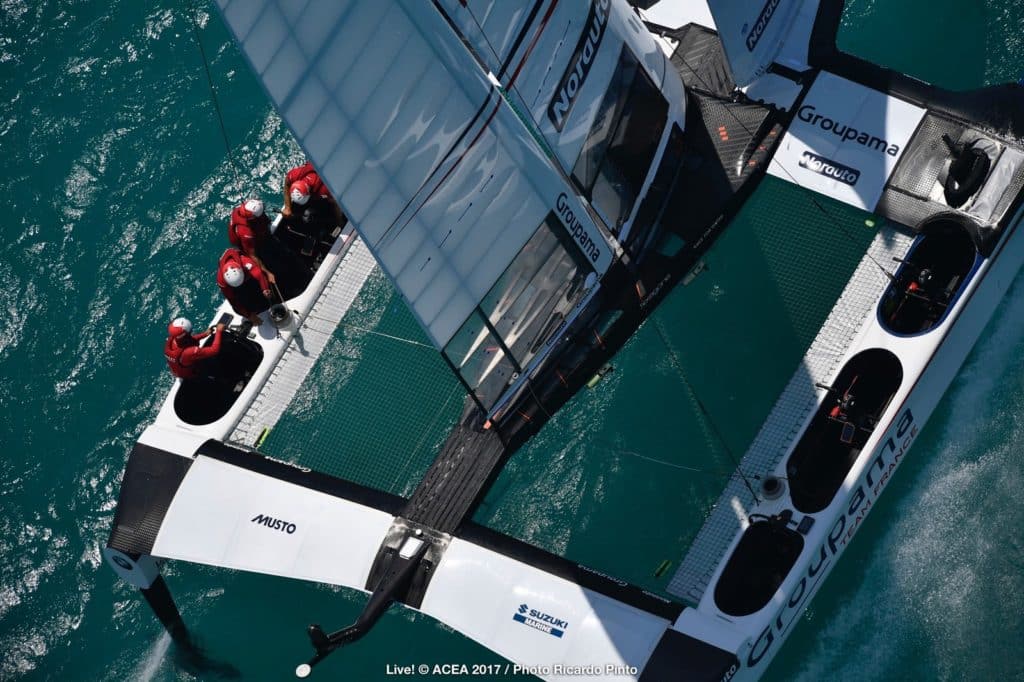
In the pre-start of the match, Land Rover BAR had the Frenchmen stuffed and was able to peel across the line a good 8 seconds ahead. Quick and stable down Leg 2, the British were pushing 40 knots in 17 knots of breeze, but so too was Frank Cammas aboard his white weapon. Only 15 seconds separated the two as they split at the bottom gate, the French going left (looking upwind) and the Brits sailing to the right-side boundary. Big lateral separation has proven to be suicidal on this shift-riddled racecourse, but the two came back at each other mid-course, bow to bow, with Land Rover BAR in command, on starboard, before engaging in one of the afternoon’s many high-speed dial downs.
The AC50 goes a lot faster when you’re 10 degrees lower, Oracle Team USA’s Andrew Campbell, explained to me, which is what makes the dial down so powerful. “With any duck you’re suddenly 7 knots faster, and as soon as the port boat ducks and is burning that speed off back to get to VMG course, he’s immediately gone past the other guy. If you’re on starboard and bow even, you might be reluctant to aim at the guy, but you have to meet that guy at the same speed or you’ll never make it out alive.”
This particular dial-down sprung Groupama, which midway up Leg 4, gained the starboard advantage and control of the race. Land Rover BAR’s valiant comeback effort at the top of the beat (on the raw audio feed Mr. Anslie could be heard pleading for his grinders to dig deeper and deeper) unraveled when the two met at the top mark. With Groupama screaming in on a starboard layline to the left gate, Mr. Ainslie attempted a rushed tack on the inside track—a terrible tack at that—and the Frenchmen simply foiled past them at 40 knots.
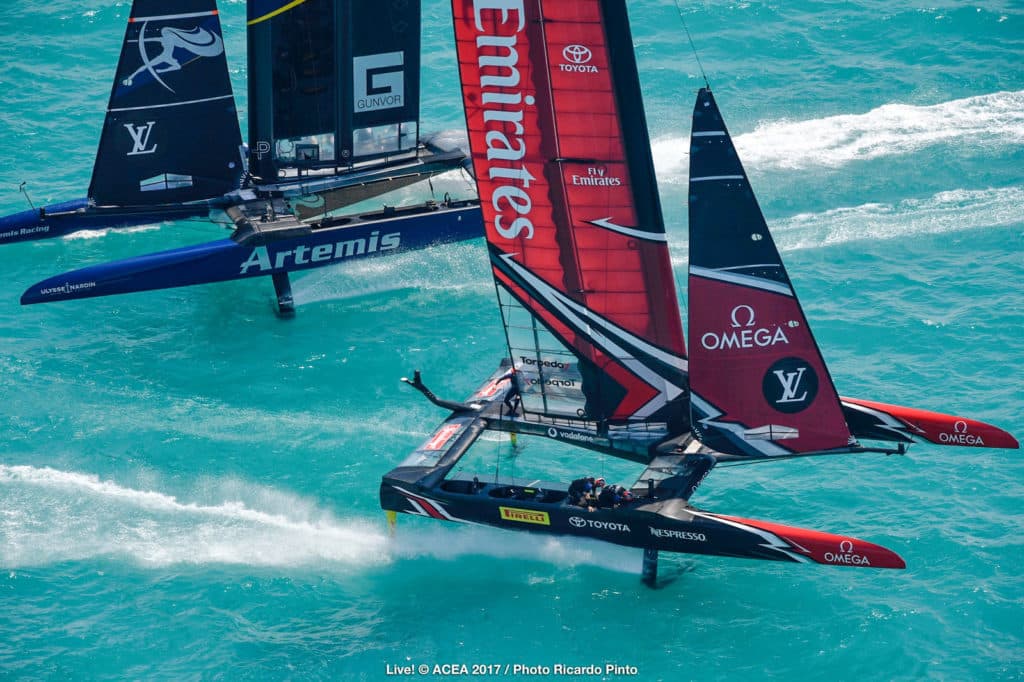
From there, Cammas maintained consistently better flight and boatspeed to stretch his delta to nearly 300 meters and eventually a 52-second whipping at the finish.
It was another shocker of a loss for Land Rover BAR, which suddenly finds itself among the teams with the remote possibility of being sent home early. And surprisingly, alongside Land Rover BAR on the precipice of elimination is Artemis Racing Team, which suffered the most devastating and contentious loss of the regatta thus far.
It was definitely the most anticipated of the three matches today. The New Zealanders were coming in with momentum and Artemis was looking to regain its pre-regatta street cred. However, if Emirates Team New Zealand’s Peter Burling has one weakness on the books it’s his lack of match racing experience, and in their prestart Artemis played it perfectly. They denied the New Zealander’s a hook and shut them out at the bottom end of the starting line. Gliding toward the start with 3 seconds to go, however, Outteridge turned his boat a fraction to soon and got pegged with an OCS penalty.
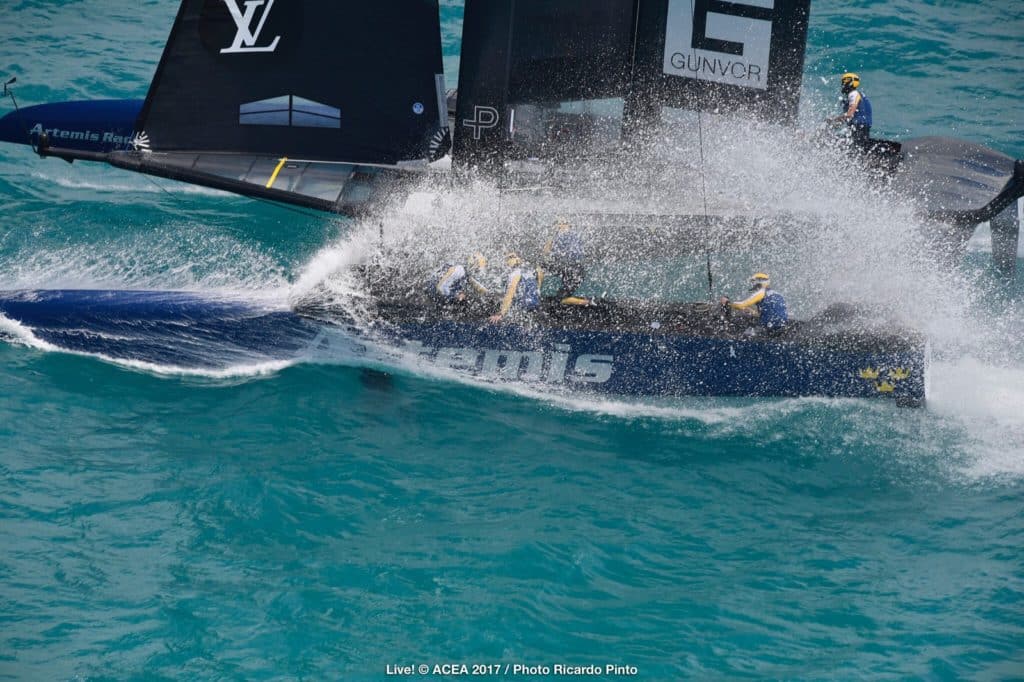
With the blue light blinking, Artemis completed its slow-down penalty as the two boats reached Mark 1, creating what was essentially a re-start.
Each of the teams teased 40 knots of boatspeed down the leg and went through the first gate with only 9 seconds between them. A split sent the Kiwis right and Artemis left and they traded sides back and forth with Artemis consistently faster at times—as much as 3 to 4 knots. Back and forth the two went, dial down after dial down, grinders huffing and puffing, scrapping for every meter.
Artemis’ Ian Percy was on top of his game, but the two met again at the top gate with a heartbeat between them. Artemis, on starboard layline, forced a Kiwi duck and then immediately piled on the lead along the right side of the racecourse, foiling away in better wind. One uncharacteristically bad jibe on the part of the Kiwis appeared enough to put Outteridge and Co. firmly in control before the final turn to the finish.
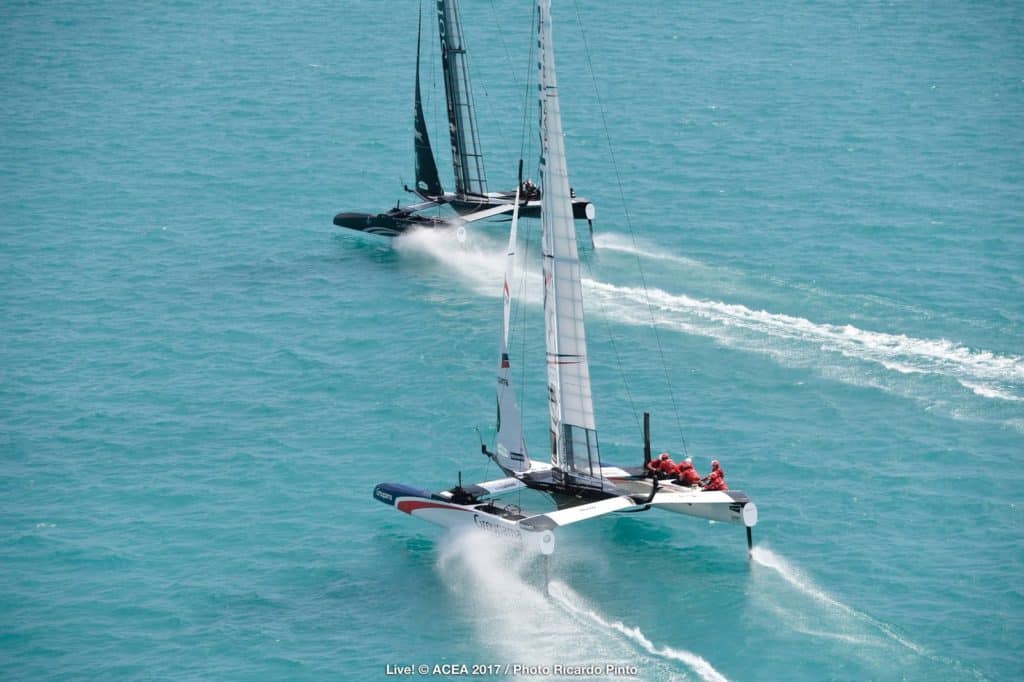
But after completing their jibe, with the attention of “splitting the gates,” (Outteridge later explained) they left what they felt was enough room for Emirates Team New Zealand to complete its jibe.
The finish mark was on their bow. All they had to do was sail straight. The cross would be close. And then it got closer.
Suddenly, Artemis appeared to just be able to cross the New Zealanders who jibed to round the mark, came hard off their foils and crashed down in plume of spray. As Outteridge locked his target on the grandstands in the America’s Cup Village, the epic battle appeared to be won. But Burling reached for his protest button (he later stated that he thought he should have been given more room to safely round the mark).
The blue light lit on Magic Blue moments later, much to the surprise of both Percy and Outteridge, both of whom were incredulous. “Absolute rubbish,” is how they described the umpire call in the moment. Bewilderment and frustration swept across the crew, and with the finish line so close, all they could do was slow down and watch as Emirates Team New Zealand whistled past and snatched the point.
Chief Umpire Richard Slater immediately explained to the broadcast commentators that it was a port-starboard infraction that earned Artemis its penalty. With umpires on the water and in the booth using sophisticated positioning software, calls on the water are final. Unfortunately, Outteridge would learn, umpires make mistakes too.
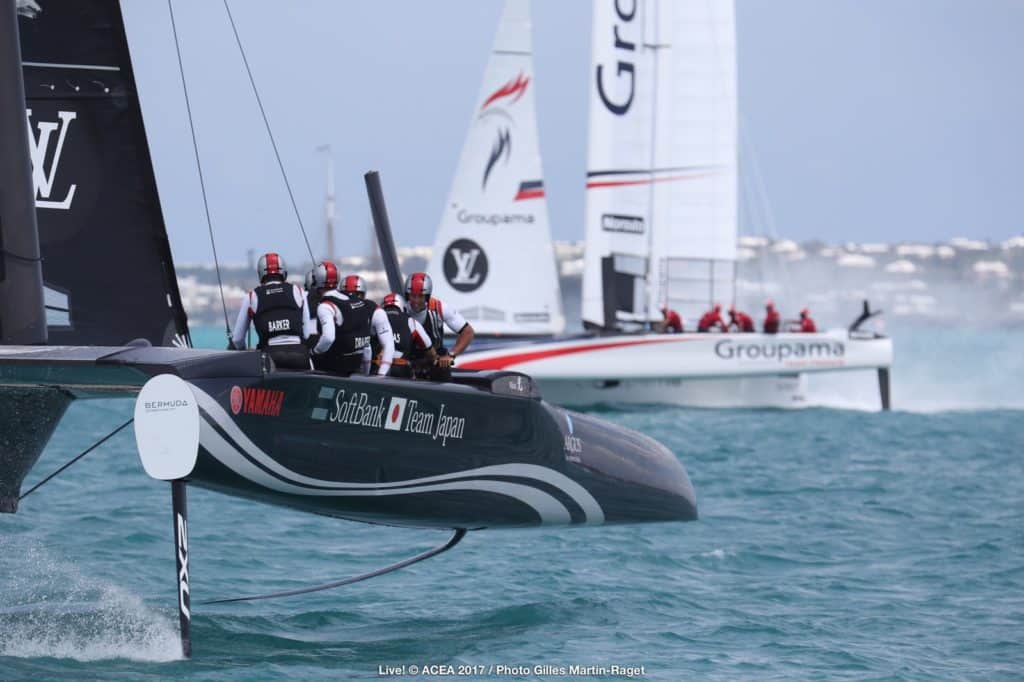
In a statement issued a few hours after racing, Mr. Slater admitted as much: “When they were coming down to the final gate mark, with the information we had at the time, we had Artemis Racing on port, as the keep clear boat, and Emirates Team New Zealand on starboard, and our job is to be certain that Artemis Racing were keeping clear, and we weren’t at that time certain they were keeping clear,” he said. “We have had a discussion, we have looked at other evidence, information and data, and I think if we were to go back in time and make that call, we would green that call and not penalize Artemis.”
Unlike with other professional sports there’s no reversing calls made on the field of play, so while it will be a bitter pill for Artemis to chew on for the remainder of the series. One can only hope it doesn’t come into play later on. Still, the Swedes can take comfort in the fact that they sailed a brilliant, high-pressure race against best challenger in the fleet and won, just not on paper.
Groupama, which started off so well, ended the day with a trouncing at the hands of Dean Barker and SoftBank Team Japan. Barker nailed a full-speed foiling start and never looked back. As in races past, SoftBank has proven they can consistently fly through maneuvers and stay on pace. They’re plenty fast and able, but to get back into the top tier they need to stop making unforced errors, which as we’ve learned thus far is much, much easier said than done.
Standings After Round Robin 1
ORACLE TEAM USA 5 Emirates TNZ 4 Land Rover BAR 3 Artemis Racing 2 SoftBank Team Japan 2 Groupama Team France 2

